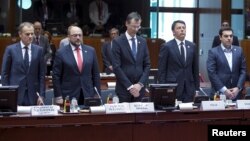Greek Prime Minister Alexis Tsipras called for a speeding up of work to conclude a reform-for-cash deal with eurozone creditors to keep his country afloat after talks with German Chancellor Angela Merkel on Thursday that both sides called constructive.
The leftist Greek premier met the conservative German leader before an emergency European Union summit on migration, a day before eurozone finance ministers meet in Riga to review progress - or the lack of it - in slow-moving negotiations between Athens and its international lenders.
"The prime minister asked that the procedures be speeded up so that the decision, which foresees a first interim agreement by the end of April, be implemented," a Greek official said of the Merkel talks.
The official told reporters there was "convergence" that Greece would aim for a primary budget surplus - before debt service - of 1.2 to 1.5 percent of gross domestic product this year. That is far below the goals of 3 percent in 2015 and 4.5 percent in 2016 set in Greece's 2012 EU/IMF bailout program.
The "convergence" also covered privatizations, of which he gave no details, and making Greece's general secretariat for revenues independent of the finance ministry, he said.
A German government source called the meeting "constructive" and said both sides had agreed on strict confidentiality.
Berlin has so far insisted that Athens must carry out commitments made by a previous conservative-led government to reform labor markets, pensions and sales tax to unlock urgently needed international bailout funds, although it accepted in February some leeway to lower the primary budget surplus.
EU officials said Merkel would deliver a message that she wants to keep Greece in the single currency area and avoid a catastrophic default, but to achieve that, Tsipras' government must commit in technical talks to detailed, costed measures to make public finances sustainable.
"At the highest level, the Germans want to keep Greece in the euro area and find a solution, but time is running short and there may have to be more drama before Tsipras can put his foot down and reach an agreement," one senior official said.
While Greece has pushed for a quick political agreement, the chancellor has so far insisted it is up to Athens to satisfy representatives of the European Commission, the International Monetary Fund and the European Central Bank first.
European Commission Vice President Valdis Dombrovskis, speaking in Berlin, said there were increasing doubts about the situation in Greece, warning that if financial instability returned, there would be no economic growth this year.
He said he no longer saw a deal this month but negotiations could run beyond the April 30 deadline and he expected agreement sometime during May. Given its tight cash position, Greece had reasons to speed up the talks and its reform plans.
"Progress is not good," he told ARD German television.
Payment Hump Looms
Greece has yet to agree with its partners on a comprehensive list of reforms to secure 7.2 billion euros remaining from its 240 billion euro EU/IMF bailout. Without a deal, investors fear it could run out of money and default on its official creditors, possibly forcing it to leave the 19-nation single currency area.
Eurozone and Greek officials said on Wednesday that Athens could probably scrape together public cash reserves to meet its payment obligations into June, but it faces a hump of bond redemptions to the ECB in July and August that it cannot meet without a fresh injection of funds.
"We can't wait for a deal in June due to our liquidity problems. We must find a solution before that," a government official in Athens told Reuters on condition of anonymity.
The ECB's chief economist, Peter Praet, said the central bank was prepared to keep authorizing emergency lending to Greek banks for now because they were assessed to be solvent.
"It is true that it is a stressful situation," Praet said at an event in Berlin. I'm not going to discuss how long this will go on. Verbal discipline is of the essence in crisis times."
The ECB agreed on Wednesday to raise the cap on emergency liquidity assistance to Greek banks to 75.5 billion euros and did not toughen the conditions on collateral they have to present for funding, banking sources said.
The ECB's Governing Council is reviewing the Greek lending weekly. Tsipras, elected in January on an anti-austerity platform, is resisting cutting pensions, liberalizing the labor market or raising value-added tax on Greek holiday islands.
EU officials said Brussels was pressing Athens to move ahead with other measures, such as a radical shake-up of product and service markets to sweep away privileges and protections for vested interests, as well as greater fairness in taxation to shift the burden to the better-off and improve collection.
They are also looking for progress on privatizations, which leftist ministers halted when they took office in late January.
Greek daily Kathimerini reported that Athens is considering asking the eurozone's rescue fund to buy Greek government bonds held by the ECB to pay for debt redemptions due this summer.
That would amount to a third Greek bailout requiring eurozone governments' agreement and parliamentary approval in some countries, such as Germany and Finland, which could only be achieved if there were a deal on a comprehensive reform package.





